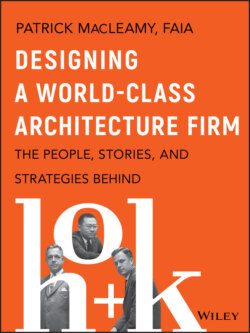Читать книгу Designing a World-Class Architecture Firm - Patrick MacLeamy - Страница 40
HOK Stock Rules
Оглавление1 HOK stock is for active employees onlyStock ownership was limited to active employees, including the founders. When someone retired or left the company for any reason, they were required to sell their HOK stock back to the company and the company was required to buy it at the current month's price.
2 HOK stock may not be part of an inheritanceIf an active employee dies, heirs receive the cash value from the employee's stock, not shares. This provision was designed to prevent surviving spouses or children of employees from having a say in the operation of the firm.
3 The founders' stock ownership is age-limitedThe founders were required to sell their stock back to the company at age 65. They could continue working at HOK but could no longer be an owner. This provision prevented a weakness of many firms, where the owners stay on too long and leave the staff with no ability to buy them out. This provision only applied to the founders.
4 Stock ownership will be in a parent companyThe founders were confident HOK would open offices in other cities, and a number of separate companies would need to be formed to allow for that to happen. However, they wanted stock to be issued from only one company, which eventually became HOK's parent company.
This ownership relationship required HOK to operate in a more businesslike way. The founders never took all the money out of the firm at the end of the year as a partnership might, instead reinvesting some of each year's profit back into the company. They made good livings, but never became fabulously wealthy, because they chose to put money back into the company. They had a bigger mission in mind than just dollars—they were investing in the long-term future of the firm.
The founders developed a plan to offer stock to key employees as a method of expanding ownership to the next generation of leaders. Their goal was to create a virtuous cycle. As senior leaders retired, upcoming leaders would become owners. They also invited a handful of those next-generation leaders to serve as HOK board members. Board members did not have much power, which stayed with the small committee of founders running the firm, but they got a chance to learn and brought in their own fresh ideas and new perspectives. Board membership would become so important later that we would restructure the firm to create more opportunities for future leaders.
Another advantage of offering employees stock was that the additional stock sold to younger employees consisted of newly issued shares, not the original stock held by the founders. By selling stock to employees rather than giving it to them, the value of HOK increased by the amount of money the new owners put into the firm. Thus, HOK stock was not diluted, and retained its value. The founders began to offer HOK stock to younger people well before any of the three approached the mandatory age when they had to sell their stock back to the company. In the years before I joined the firm, the founders offered stock to only a few key employees. But in 1968, they conducted the first large-scale stock sale to about 20 selected employees. I was fortunate to be included in that group.
It's important to note that HOK did not give stock to its employees. Rather, the firm sold stock to us—just like any corporation would—and we had to come up with the money to buy it. HOK made this process almost painless by arranging with Boatmen's Bank, HOK's corporate bank at that time, to extend an automatic loan to any employee buying stock. HOK received the loan proceeds in exchange for the stock, and the employee paid off the loan over the course of a few years, with an automatic payroll deduction.
When HOK offered me this ownership opportunity, I was still wondering if I should stay with the firm. Having a piece of the ownership gave me a seat at the annual shareholders meeting and made me feel like part of something bigger. It cemented me to HOK in ways I didn't entirely understand at the time. Buying that stock was one of the smartest things I ever did. Later, I would use stock ownership to reunify HOK, after we had lost our way.
